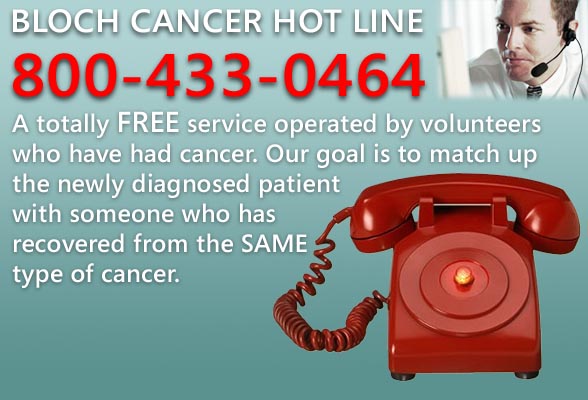Recognizing the need:
- One out of every four Americans will get cancer. The diagnosis and treatment can be very traumatic experiences.
- Many people equate cancer with death, not realizing that with prompt, proper care and a positive outlook many cancers can be cured.
- Some people are so fearful of cancer and its treatments that they often unwisely delay or deny them.
- Cancer patients and their families endure tremendous emotional stress which could be lessened if they could share their fears with someone in a similar situation.
- Many cancer patients and family members haven’t the slightest idea of what local and national cancer resources are available, and they don’t know how to begin to look for these resources.
Where can a cancer patient turn for understanding and information?
Filling the need
A Cancer Hotline may be just what your community needs to provide this service. In those first hours and days after cancer diagnosis a Hotline is an especially important communication link. Talking with another person who has been through similar experiences can make a big difference.
When a person calls the Hotline, a volunteer will take information such as name, phone number, age, sex, type of cancer. The caller is told that a volunteer will be matched to them and we will try to have a call returned within 15 or thirty minutes. If it will be longer, they will be advised. The caller is matched to a volunteer with, whenever possible, the same type of cancer, the same sex, and the approximate age.
If you think of a Hotline as a business, its product is real hope. Real hope comes in two forms. First, talking with a cancer patient who is cured or being effectively treated demonstrates that death and cancer are not synonymous. Second, a Hotline provides newly diagnosed patients with advice and counseling as they explore their options and reach decisions regarding treatment.
A Hotline caller may never think of the Hotline as a business, but if you sincerely want to start a Hotline in your community you need to look at it that way. It will take a lot of dedication and persistence, but helping people has very satisfying rewards.
There is no perfect blueprint for starting a Hotline, every community and situation is different. There are only suggestions and guidelines. That is how you should use this information.
Funding a Hotline
A Hotline does not charge patients for the service it provides. Funding must come from other sources. With the right sponsor and resourceful organizers, you can keep your costs low.
Finding a sponsor is important because you will be asking for a lot of help from the community. You may be able to find a person willing to assume total financial support. That’s great, but don’t give up if you don’t find that kind of sponsor.
What kind of person makes a good sponsor? A sponsor is a door-opener. Look for a person who is respected, well-known in the community, and willing to give a lot of time and effort to the Hotline. This person can be a cancer patient, a physician, or any concerned citizen whose blessing will lend credibility to the Hot Line.
Remember, your primary goal is helping, not fundraising. Don’t solicit public donations. Your organization needs can best be met securing continuing commitments for services from business, organizations, and individuals.
You will need to apply for status as a not-for-profit corporation. That will make your organization eligible for tax exemptions and mailing discounts. Find a lawyer willing to donate the necessary expertise.
Facilities for a Hotline
The Cancer Hotline in Kansas City was originally operated through Human Rescue, a crisis intervention bureau. Human Rescue received the initial calls and matched them to Hotline volunteers who then responded.
As we grew, our volunteers took over the matching responsibilities. It was not until we exceeded an average of ten calls a day that we decided to staff our own office.
If there is a crisis intervention bureau in your community, try to become a part of their program. If not, try to find a business willing to arrange for a secretary to take Hotline calls and make the matches.
A printer willing to help your organization will be very beneficial. Printing needs will arise once you begin your promotional efforts.
Callers want current resource information. The U.S. Department of Health and Human Services publishes many brochures about cancer types and treatments. These are available at no cost, and can be forwarded to callers.
Develop your own resource list. This list includes all cancer care institutions, organizations, and services in the area.
However, the most important resource of a Hotline will be its volunteers. It isn’t necessary to begin with a huge pool of volunteers. That pool will grow as your Hotline does. A Hotline can be started by two or three cancer patients. No Hotline can expect to receive more than one or two calls a day at the outset. You can schedule training two weeks after publicity begins. Publicity will generate volunteers as well as callers. Personal recruiting is also valuable.
Volunteers who are used as matches with callers are people who are successfully coping with their cancer. They will need to be trained, so it is important that they have a positive attitude, accept established cancer treatments, and have a desire to help others. Screening is essential during the training because not all people are effective in personal contact. Screening is done through interviews with experienced volunteers.
Some people volunteering will be unacceptable to use as matches. They can be used in other ways, such as getting publicity.
Organizing a Hotline
A Hotline is no better than its leaders. They should be motivated solely by the desire to help the next person who is diagnosed as having cancer. Your Hotline will work best if you keep responsibility spread out among many people.
Our recommended organizational chart follows. This is a board structure similar to that which we use in Kansas City. As each position is discussed, you’ll learn about its function and get some suggestions for a better program.
The Chairperson heads the organization and oversees all its phases. This volunteer must be an efficient manager and good motivator, presiding at monthly board meetings. A nominating committee is used to provide for an annual change of officers.
The Services division is headed by a vice chairperson who coordinates all the service committees. Committee heads have more specific functions, working with several volunteers on each committee.
Telephone: This committee establishes a connection with a service to answer the telephone and match the calls. It is responsible for continuing supervision and acts as a liaison between the Hotline and the service.
Volunteers: The Volunteers committee refers to persons at home who serve as matches. The committee prepares and maintains the operating manual. It also keeps the file of volunteers current, and is responsible for all communications with volunteers. The matching file works best when volunteers are categorized by type of cancer. Each person’s name and phone number should be followed by their address, age, sex, date diagnosed, and type of treatment. This makes for better matches.
Training: This committee is responsible for the screening and training of all volunteers. Training sessions are held about every three months, after the initial two or three which are biweekly. A training outline can be obtained from Kansas City.
Refresher sessions are scheduled every three months by this committee. These sessions give volunteers a chance to discuss their experiences, and feel more a part of the organization.
Quality Control: Caller follow-up is the responsibility of this committee. Questionnaires are sent to callers within four weeks of their contact with the Hot Line to be certain they were properly handled.
A vice chairperson also heads the publicity division and coordinates its various committees. This area can not be emphasized enough. If the public doesn’t know about your Hotline, how can anyone be helped? Publicity generates callers and volunteers, but it is difficult to maintain. Keep trying. Each committee must have enough volunteers to make all the necessary contacts without expecting too much from any individual.
Flyers: Flyers modified with your phone number are printed on the overage from commercial runs. They are sent in monthly statements by utilities, banks and savings and loan, stores, insurance companies, and other businesses. Also flyers are used as handouts at speeches, meetings, and health fairs or put into grocery bags by grocers. Committee members may be responsible for a type of business and/or an area of the city.
Newspapers: Press releases are the standard communication link with newspapers. This committee is responsible for seeing that area newspapers keep the public informed of the Hotline’s existence. Local columnists and community calendars can be contacted, as well as using interviews and feature stories.
Shoppers, trade newspapers, etc.: These media give space to not-for-profit organizations more freely. A Hotline logo and phone number makes good end-of-column filler. Trade newspapers and house organs can be good markets for feature stories about the Hotline or individuals involved with the program.
Television: The television committee will be concerned with public service announcements (PSAs), as well as interviews. Contact local stations for their help in writing and producing a short PSA. TV stations are required to air a certain amount of PSAs and they are glad to help a local group. Keep reminding them to air it, then thank them.
Radio: PSAs and interviews are again the main concern. Provide stations with a fact sheet, and written announcements in varying lengths. If you have scripts that can be read in 10, 20, and 30 seconds, you will get more air time.
Scripts, soundtracks, and videotape are available from the Kansas City Hotline for your use. You may be able to get a record of the times your PSAs were aired by a radio or TV station if you request it.
Speakers Bureau: An active bureau provides much publicity for a Hotline. This committee is a group of good public speakers who are well-informed about the Hot Line. Potential audiences must be contacted. They include churches, businesses, personnel departments, hospitals, school groups, senior citizen groups, clubs, and service organizations. With the help of other committees it is possible to provide speakers for interviews and local television and radio talk shows.
Maintaining a Hotline
Volunteers must be kept motivated. Initial enthusiasm will wane. Burnout is not uncommon among volunteers. Keep a steady stream of new volunteers.
Publicity keeps callers and volunteers coming to the Hotline. When your Hotline is new it will attract a lot of interest. A strong committee is needed to keep the publicity going, month after month, and keep public awareness high.
Don’t get discouraged, you will encounter adversity. Expect it. Keep going the proven way. You’re doing good work by starting a Cancer Hotline. You’re giving real hope.
For further information contact:
Cancer Hotline
One H&R Block Way
Kansas City, Missouri 64105
(800) 433-0464 or (816) 854-5050


